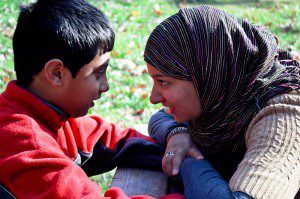 Spring break has started here, and the kids are home. I sent my younger two off to Jummah namaz (Friday prayers) with my inlaws. Lil D and I are hanging at home, doing our own Friday prayer ritual today. With his recent bouts of escapism and wandering, I don’t feel comfortable taking him to the mosque today, so we are doing our own thing at home, and much of that “own thing” has come from the advice I received after writing about the Jekyll and Hyde of autism, advice that I later detailed in my “religious rituals to break autism’s meltdown” post.
Spring break has started here, and the kids are home. I sent my younger two off to Jummah namaz (Friday prayers) with my inlaws. Lil D and I are hanging at home, doing our own Friday prayer ritual today. With his recent bouts of escapism and wandering, I don’t feel comfortable taking him to the mosque today, so we are doing our own thing at home, and much of that “own thing” has come from the advice I received after writing about the Jekyll and Hyde of autism, advice that I later detailed in my “religious rituals to break autism’s meltdown” post.
Many of you commented after that post, or left comments in Facebook to keep you posted about how things were coming along. Am I doing more dhikr with Lil D? Am I using the rituals of salat and tasbih to help bring him out of meltdowns, or as a calming method?
I can report that two things are happening: In the afternoons, after he comes home from school and before home therapy begins, Lil D likes to head downstairs to his grandparents’ bedroom and wrap himself up in blankets on their bed. My mom-in-law or father-in-law will lie down with him and recite Qur’an to him. He snuggles up close, makes some amazing eye contact, and seems to enjoy that time.
I have been begun trying the recitation of dhikr (along with my usual arsenal of “do this, do this, do this” prompts) when meltdowns are coming or happening. But more so, at bedtime, I sit in his room, finger the tasbih, and whisper dhikr in his ear. Does it help him? God only knows. But it helps me. Because as a friend astutely pointed out to me: Sometimes the purpose of prayer is to change us, not our circumstances.
I wrote more about this for an editorial I penned for the Parliament of World Religions eNewsletter:
I’ve recently taken up saying prayers on my tasbih – much more so than I ever did in my life before. I sit in the rocking chair in the corner of my son’s room fingering my tasbih (something akin to a rosary), doing dhikr while he burrows under the covers on his bed, pulling the weighted blanket over his face as he retreats from the world and takes comfort in the dark, close, muffled space where nothing assaults his senses.
My goal is that he should finger the tasbih while I say the prayers, especially when he shows signs that a meltdown is coming, or is in the throes of a meltdown. He likes to play with beads, stim on them. So I’m hoping he’ll grow to play with the tasbih and learn to use the tasbih as a method of grounding routine and ritual – something recently pointed out to me by a very astute Catholic autistic adult who read a recent blog post I wrote about my son’s struggles.
We’re not there yet, but for now, me just doing dhikr while fingering the tasbih seems to help calm my autistic son. Maybe it’s the prayers, maybe it’s not. But it gives me comfort; it’s something to do, a way to throw my line back to God and put some previously lacking trust back in His will.
Please click here to read more.
The meltdowns and self-injurious behavior has not magically lessened, but in addition to the doctor’s visits, endless meetings with school, biomedical and medical research, changes in therapies, I feel like we’re trying to be more aware of God in all this, even when I despair of what Lil D endures.
Today another kind commentor left a message on that Jekyll and Hyde post, saying, “You yourself write beautifully, and it may be that your son will inherit your gift, or have great powers of intuition not given to us lesser mortals, whether we are Hindu, Buddhist, Jew, Christian or Muslim etc.”
I don’t know what Lil D will inherit from me. But I hope I inherit resilience, patience, strength, and trust from him. Sometimes, though autism awareness is touted especially in April, that awareness is not just for those unfamiliar with autism, it is for those of us living with and caring for a loved one who is autistic.











